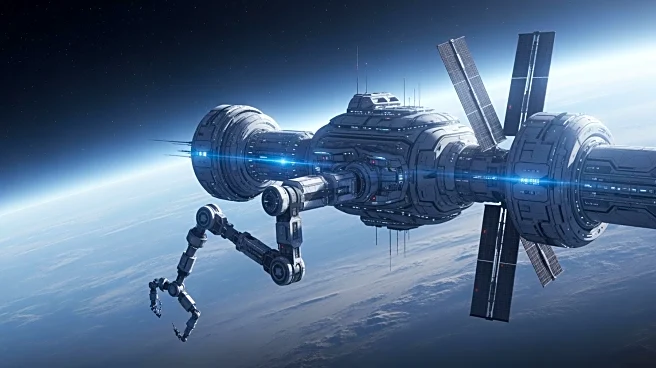What's Happening?
A new report from the Mitchell Institute for Aerospace Studies suggests that placing Space Force personnel in orbit could provide strategic advantages in military operations. The report, titled 'A Broader Look at Dynamic Space Operations: Creating Multi-Dimensional
Dilemmas for Adversaries,' emphasizes the need for the Space Force to enhance the maneuverability, flexibility, and survivability of its systems, including satellites, in response to technological advancements by adversaries like China. Charles Galbreath, a former Space Force officer and current senior fellow at the Mitchell Institute, argues that human presence in space could offer tactical benefits, similar to past missions involving human astronauts for satellite repairs. The report also highlights the potential deterrent effect of having military personnel in space, as it raises the stakes for adversaries considering hostile actions.
Why It's Important?
The proposal to deploy Space Force personnel in space could significantly impact U.S. military strategy and operations. By enhancing the adaptability and decision-making capabilities of space missions, the U.S. could better counter threats from nations like China and Russia, who are advancing their counter-space technologies. The presence of humans in space could also serve as a deterrent, as adversaries may be less inclined to attack crewed space assets due to the higher risk and ethical considerations involved. This development could lead to increased investment in training and technology to support human operations in space, potentially reshaping the future of military engagements and space exploration.
What's Next?
The Space Force is currently developing a planning document to predict future enemy trends through 2040, which will guide the acquisition of key technologies and mission priorities. This includes the creation of a 'live aggressor squadron' for training purposes. As the concept of deploying guardians in space gains traction, the Space Force will need to establish training pipelines and develop capabilities to support human operations in space. This strategic shift may require long-term planning and investment to ensure readiness for future space missions.
Beyond the Headlines
The ethical implications of deploying military personnel in space are significant. The presence of humans in space could alter the risk calculus for adversaries, potentially reducing the likelihood of hostile actions. Additionally, this move could influence international space policy and cooperation, as nations may need to address the militarization of space and its impact on global security. The integration of human decision-making in space operations could also lead to advancements in autonomous technologies and artificial intelligence, as the military seeks to balance human and machine capabilities.
















